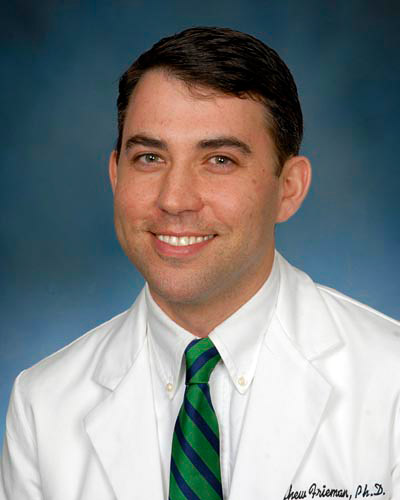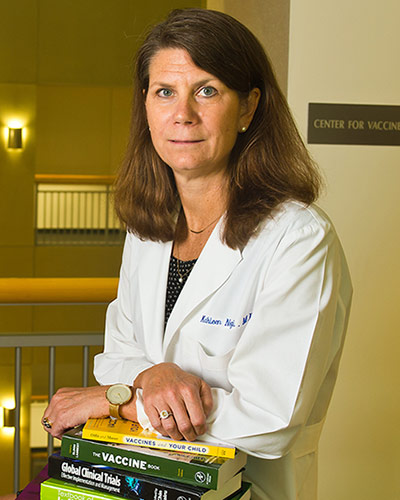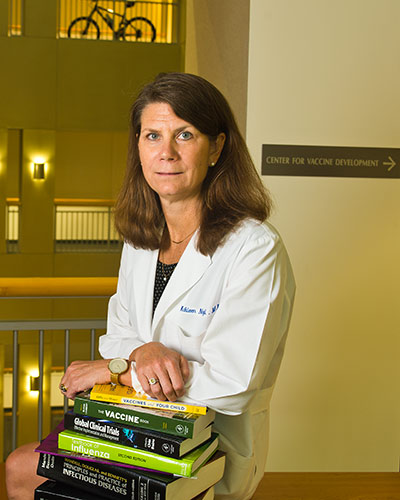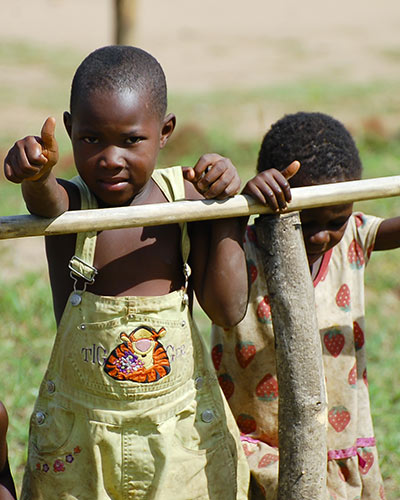May 03, 2018 | JMorrison@som.umaryland.edu

Research published in PNAS, showed that even less effective influenza vaccines can still help to reduce illnesses, hospitalizations and other issues as long as the vaccine is broadly administered across age groups.
Meagan C. Fitzpatrick, PhD., Research Associate at the Center for Vaccine Development and Global Health, was among the co-authors of the research, which showed that health burden resulting from influenza is more sensitive to changes in vaccination coverage rather than changes to vaccine efficacy.
For example, the study projected that a vaccine with 20% efficacy and 43% coverage could avert 20.99 million infections, 129,701 hospitalizations, 61,812 deaths and 2.22 million disability-adjusted life years (DALYs).
“We found that even relatively low-efficacy influenza vaccines can be highly impactful, particularly when vaccine uptake is optimally distributed across age groups. As vaccine efficacy declines, the optimal distribution of vaccine uptake shifts toward the elderly to minimize mortality and DALYs,” the report stated.
Read the PNAS Journal Article >>
Contact
Department of Anesthesiology
(410) 328-6120 (phone)
(410) 328-5531 (fax)
swalsh@som.umaryland.edu
Joanne Morrison
Director of Marketing and Public Relations
Center for Vaccine Development and Global Health
University of Maryland School of Medicine
jmorrison@som.umaryland.edu
Office:(410) 706-2884
Related stories

Thursday, March 28, 2024
NIH selects Dr. Kathleen Neuzil as Director of The Fogarty International Center
Kathleen M. Neuzil, MD, MPH, Director of the University of Maryland School of Medicine’s (UMSOM) Center for Vaccine Development and Global Health, has been named the 13th director of the Fogarty International Center (FIC), which is part of the National Institutes of Health (NIH). Dr. Neuzil will be the first woman to hold the permanent directorship since the center’s founding in 1968 and will also hold the position of Associate Director for International Research at NIH.

Friday, February 05, 2021
UM School of Medicine Researchers Demonstrate Strong Immune Response for New COVID-19 Vaccine in Pre-Clinical Tests
Researchers at the University of Maryland School of Medicine (UMSOM) have found promising results in pre-clinical studies for a new experimental vaccine against COVID-19 made by Novavax. The vaccine was found to generate a robust immune response in animals exposed to the vaccine with strong data indicating safety and efficacy, according to the study published recently in the journal Nature Communications. The results have been used to begin testing the vaccine in human trials in the U.S. with a Phase 3 trial that recently launched at the UMSOM’s Center for Vaccine Development and Global Health.

Tuesday, December 10, 2019
UMSOM Researchers to Test Vaccine Designed to Protect Against Serious Illness from Contaminated Food and Water
Each year, millions of people contract serious diarrheal illnesses typically from contaminated food and water. Among the biggest causes of diarrheal diseases are the bacteria Shigella and enterotoxigenic Escherichia coli (ETEC), and researchers at the University of Maryland School of Medicine are testing a vaccine designed to offer protection against these serious pathogens.

Friday, September 20, 2019
UM School of Medicine's Center for Vaccine Development and Global Health Receives NIH Contract of up to More than $200 Million for Influenza Research
Kathleen Neuzil, MD, MPH, Professor of Medicine and Pediatrics and Director of the Center for Vaccine Development and Global Health (CVD) at the University of Maryland School of Medicine (UMSOM) and Dean E. Albert Reece, MD, PhD, MBA, announced that CVD has been awarded a contract from the National Institute of Allergy and Infectious Diseases (NIAID), with total funding up to more than $200 million over seven years if all contract options are exercised.

Tuesday, August 13, 2019
UM School of Medicine Researchers Begin Phase 1 Clinical Trial of Vaccine Against Mosquito-Borne Diseases
Mosquito-borne diseases including malaria, dengue and yellow fever, have a severe impact resulting in millions of deaths worldwide, hitting the world’s most vulnerable populations the hardest. Researchers at the University of Maryland School of Medicine (UMSOM) have begun testing an experimental vaccine that is designed to protect against a series of these diseases.

Friday, November 02, 2018
UMSOM Global Health Expert Named to Prestigious World Health Organization Immunization Panel
Kathleen Neuzil, MD, MPH, Professor of Medicine and Pediatrics and Director of the Center for Vaccine Development and Global Health (CVD) at the University of Maryland School of Medicine (UMSOM), has been named to the World Health Organization’s (WHO) Strategic Advisory Group of Experts (SAGE) on Immunization.

Wednesday, June 06, 2018
UMSOM Researchers Find that Silent Carriers of Malaria are Unlikely to Develop the Disease
In regions where malaria illness is widespread, it is common to find many individuals who are infected with malaria parasites (Plasmodium falciparum), but without symptoms. New research conducted by the University of Maryland School of Medicine (UMSOM) shows that treating these silent malaria cases could help stop the spread of malaria to others.

Tuesday, May 15, 2018
Tackling Malaria Transmission in Sub-Saharan Africa
Two malaria experts in the Center for Vaccine Development and Global Health at the University of Maryland School of Medicine wrote a commentary published in the June Issue of The Lancet Global Health discussing the prevalence of malaria in school-age children in sub-Saharan Africa. Miriam Laufer, MD, Associate Professor of Pediatrics and Associate Director for Malaria Research CVD, and Lauren Cohee, MD, Instructor, Pediatrics, noted that often malaria infection is more common in school-age children than younger children and adults.

Friday, May 11, 2018
Honoring Dr. Robert Edelman for Three Decades of Service at UMSOM
Dr. Robert Edelman’s legacy will live long past his tenure at the Center for Vaccine Development and Global Health (CVD). Prior to an esteemed career in academia, he served in the military and the US public health service.